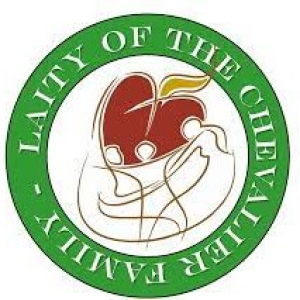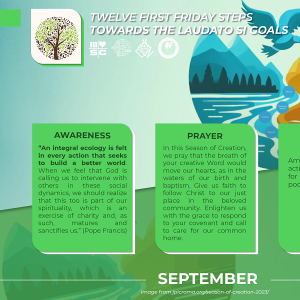Peter MALONE
Laity of the MSC Gathering, September, St Mary’s Towers, Douglas Park
Laity of the MSC September Gathering, September, St Mary’s Towers, Douglas Park


The ‘One Heart… Many Stories’ gathering invites participants to encounter their shared story with God within themselves, Creation, their personal and Chevalier Family communities, and the wider world. Let’s explore together what our individual and collective story has been, what it is, and what we dream it to be as we look forward to the future. As we listen, reflect, and speak, may our hearts connect and unite as one heart within God’s heart.
Friday (Optional)
For those arriving today, please arrive after 6:00 pm.
6:00 pm Arrive and Dinner 7:30 pm Hangout and Unwind
International
Saturday
For those arriving today, please arrive by 8:00 am.
7:00 am Breakfast
8:30 am Welcome to Country
9:30 am Our Shared Story (Gathering Opening / Presentation) (ZOOM available)
10:00 am Morning Tea
10:30 am God’s Story in Our Hearts (Keynote by Michael Fallon and guided sharing) (ZOOM available)
12:30 pm Lunch
1:30 pm Creator Heart (Guided Reflective Mediation)
2:30 pm Hearts Living Together (Presentation, personal reflection, and sharing) (ZOOM available)
4:00 pm Afternoon Tea / Free Time 6:00 pm Dinner
7:30 pm Movie / Free Time
Southern California
Sunday
7:00 am Breakfast
9:00 am Aboriginal Mass with St Mary’s Towers Parish
10:00 am Morning Tea
10:30 am Hearts Dreaming Together (Presentation, personal reflection, and sharing) (ZOOM available)
12:00 pm Continuing Our Story (Gathering Closing) (ZOOM available)
12:30 pm Lunch

Some Significant September Days for the Chevalier Family, 2023
Some Significant September Days for the Chevalier Family, 2023

Statue from Holland
NOTE:
this is an amplified version of Significant Days, combining the list made originally by Cor Novum, Issoudun, now with the addition of dates from Father Jan Bovenmars MSC’s book, Jules Chevalier, Daily Readings. His book was published in 1993 – so, more recent just from all around the congregation and the Chevalier family would be most welcome. 53 additions for September
Mother Marie Louise Hartzer appears quite a number of times this month, the death of her husband, memories of her two sons, her meeting with Jules Chevalier, her vows.
An observation: September seems a busy month for electing the MSC Superior General (and a caution about September 28th, the day of death for two of them), as well as a busy month for appointments and ordinations of Bishops. And of the erection of Provinces and Sections.
1 September, 1860
The first Roman pilgrimage of Father Chevalier.
1 September, 1881
The first missionaries for Melanesia leave from Barcelona.
1 September, 1897
The erection of the German MSC Province. Blessing of the first MSC house in Hiltrup, Germany.
1 September, 1899
First 8 candidates of the MSC Sisters are received as postulants in Hiltrup.
1 September, 1900
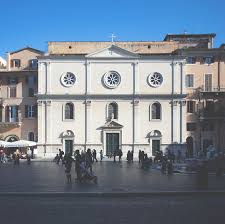
Erection of the Italian MSC Province.
2 September, 1920

Arrival of the first MSC in Manado, celebrities, Indonesia, including Msgr Vesters, later Bishop.
2 September, 1956
Death of Brother Robert South, first Brother of the Australian province.
3 September, 1901
The Congregation of Bishops and Regulars grants and indult authorising Father Chevalier to announce his position as Superior General.
4 September, 1861
Father Maugenest becomes the first MSC to be parish priest of St. Cyr, Issoudun. He remains in this position until 31 December, 1871.
4 September, 1882,
Father X. Deidier leaves Issoudun for Madeley, England, to open the first MSC house there, and Apostolic School.
4 September, 1923
Mission apostolate of MSC Sisters commences in New Ireland, PNG.
4 September, 1945

The missionaries imprisoned by the Japanese during WWII in Ramale Valley, Papua New Guinea, are set free. The movie, entitled Sisters of War, produced in 2010 by an Australian film company, tells part of this story.
5 September, 1907
This date commemorates the opening of a 'special' MSC General Chapter which revised the Constitutions in the spirit of the "Roman Norms" of 1901. This Chapter occurred only a few weeks before Father Chevalier's death. He could not be present at the Chapter.
6 September, 1962
Father Karel Verwilghen, from the Netherlands, is shot in San José Nueva Ecija, Philippines. He died on 8 September in Quezon City, Philippines.
6 September, 1985
Foundation of the MSC Mission in Curaçao, Santa Maria parish.
7 September, 1978
Father R.Paglia, appointed Prelate Nullius and Bishop of Pinheiro, ordained in the Chapel of Villa Formosa, San Paolo, Brazil, the first MSC Bishop from Brazil.
8 September, 1869
The Archbishop of Bourges, Monsignor de La Tour d'Auvergne blesses Our Lady of the Sacred Heart Chapel in Issoudun and consecrates the altar. The coronation of the statue of Our Lady of the Sacred Heart takes place this day in the name of Pope Pius IX.
8 September, 1876
Father Chevalier meets Marie-Louise Hartzer for the first time.
8 September, 1877
First profession of the first Irish MSC, John Mary Neenan.
8 September, 1908
First General Chapter of the Daughters of Our Lady of the Sacred Heart Thuin, Belgium.
9 September, 1860
Father Chevalier’s first Roman pilgrimage: audience with Pope Pius IX.
9 September, 1884
Five Daughters of Our Lady of the Sacred Heart make their first vows. Marie-Louise Hartzer is among them.
9 September. 1911
Erection of the Australian FDNSC Province.
10 September, 1892
The MSC General Council accepts 16 scholastics for perpetual vows, among whom M.Rascher, killed in the Bainings in 1906; K.Offermans, the first Dutch provincial; and J.Wemmers, the first Dutch general assistant (1905-1911).
11 September, 1958,
A group of Irish FDNSC nursing Sisters take charge of the mining hospital at Mangula, Southern Rhodesia (now Zimbabwe).
11 September, 1961
Ikela (Zaire) becomes a diocese and is entrusted to the South German MSC province, Father Joseph Weigl MSC becomes its first Bishop.
11 September, 1969
Beginning of a special MSC General Chapter of Renewal (September 11-November 14), during which the Documents of Renewal were written.
12 September, 1855
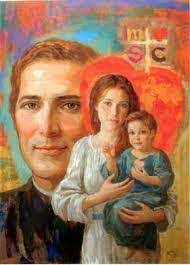
L'abbé Caillaud, the General Vicar at the time, blesses the humble chapel (barns) in Issoudun and gives to the first two members of the society, Jules Chevalier and Emile Maugenest, the name Missionaries of the Sacred Heart of Jesus. It was on this very day that Jules Chevalier thought, for the first time, of the title "Our Lady of the Sacred Heart".
12 September, 1869
Opening of the first MSC novitiate at Montlucon, France. Father Guyot is the first Novice Master.
13 September, 1884
Father Navarre leaves New Pomerania (New Britain, PNG) for Thursday Island, gateway to Papua New Guinea.
13 September, 1891
Departure of the first FDNSC for New Britain.
13 September, 1901

Mother Marie-Louise Hartzer makes her application to the French Government for the authorization of the Congregation as exacted by the law of 1 July, 1901. This fact prevents the local authorities at this time during the political-religious unrest from affixing seals to the FDNSC mother house in Issoudun.
13 September, 1912
Father Franciscus Maria Victor Jouët dies in Rome. He is buried in Marseilles in the south of France, in his original diocese. On 2 July, 2003, his remains are interred in the Crypt in the Basilica in Issoudun.
13 September, 1947

Father Patrick McCabe (Australia) is elected Superior General (1947-1958).
14 September, 1902
Departure of the first seven MSC Sisters from Hiltrup for New Pomerania, New Britain, Papua New Guinea.
14 September, 1989

Erection of the PNG Province of the Missionaries of the Sacred Heart.
15 September 1925
A first group of Belgian FDNSC, together with five MSC, leave Antwerp as missionaries for the Belgian Congo (Zaire).
15 September, 1958
Father Joseph van Kerckhoven, Belgium, is elected Superior General (1958-1969).
15 September, 1970
The Dominican Republic becomes a provincial Administration of the MSC.
17 September, 1861
Father Maugenest is appointed Parish Priest of St Cyr, Issoudun.
17 September, 1932
Father Christian Jansen, Netherlands, is elected Superior General (1932-1947).
18 September, 1981
Father Kees Braun, Netherlands, is elected Superior General.
19 September, 1869
Victor Hartzer, husband of Marie-Louise Hartzer, dies in Vesoul, France, after being married 11 years. Together they had two sons: Marie Victor Fernand (born 1858) and Marie Léopold (born 1860). Both sons became MSC Priests.
20 September, 1900
The first MSC Superior, Father Field, arrives at Québec, to prepare for the arrival of the French scholastics.
20 September, 1905.
The Marshall Islands are erected as an independent Apostolic Vicariate separated from the Apostolic Vicariate New Pomerania, new Britain, PNG. They are entrusted to the MSC already working there.
21 September, 1886
Father Deidier and the Apostolic School moved from Madeley to Glastonbury, England. The English Annals will be published from there
21 September, 1930.
The first two Filipino MSC take their vows.
21 September, 1940
Father J.Vrakking MSC, Netherlands, appointed first Bishop of Surigao, Philippines, ordained Bishop at Cebu.
21 September, 1953,
Argentina erected as an MSC Section, entrusted to the Spanish Province.
21 September, 1987

Foundation in El Salvador by MSC of the Central American Region.
21 September, 1988
Father Luke Matlaterea MSC, PNG, appointed Bishop of Bereina, ordained by Bishop Bundevoert MSC.
22 September, 1889
Father Verius, appointed Vicar Apostolic of New Britain, ordained Bishop at Yule Island. On December 28 the appointment was changed to Episcopal Coadjutor to Msgr Navarre.
22 September, 1925
Translation of the remains of Msgr Navarre (1836-1912) to Yule Island.
23 September, 1924
The first Belgian MSC go to Belgian Congo (Zaire), leave Antwerp.
23 September, 1942
Death of Father Peter L’Esperance, Pro-Provincial of USA-Canada from 1910-1939.
24 September, 1881
The novices of Father Piperon, who arrived in the Netherlands, November 1880, after having been expulsed from France, make their first profession. Among them is Hubert Linckens, who will later become the historical founder of the MSC Sisters.
24 September, 1896

Brother Archibald Shaw (“ Brother Placid”, Australia) professed on Yule Island after Novitiate in the missions.
24 September, 1922
Last Spiritual Testament of the founder of the MSC sisters, Father H.Linckens MSC, for the members of the Congregation.
25 September, 1869
The first MSC General Chapter elects Father Chevalier as First Superior General. Fathers Piperon, Vandel, Bazire and Guyot are elected as his assistants.
26 September, 1864
Father Chevalier sends his booklet “Plan of the Society of the Missionaries of the Sacred Heart “to Father LeBlanc.
26 September,
Mary Ryan, the sixth postulant and first Irish girl to enter the FDNSC Congregation, a teacher, arrives at Issouodun.
26 September, 1967
Venezuela is erected as MSC Section, entrusted to the Irish Province.
26 September, 1982
Father Joseph Tethool MSC (Indonesia) appointed auxiliary of Ambon, ordained at Ambon.
.
26 September, 1889
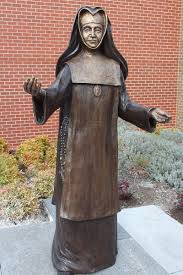
Marie-Louise Hartzer makes her perpetual vows.
27 September, 1869
Jules Chevalier and his first companions make their perpetual vows at the end of a retreat preached by Father Ramière, SJ.
27 September 1869
The house at Issoudun is canonically erected.
28 September, 1972
Father Patrick McCabe, Australia, dies at Sydney, Superior General from 1947-1958.
28 September, 1974
Death of Father Joseph van Kerckhoven, Belgium, Superior General from 1958-1969.
29 September, 1882
The first three MSC, with Father Navarre arrive at Matupit, New Britain, PNG, after travelling for 13 months.
29 September, 1936
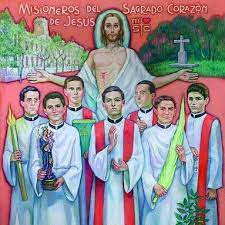
Four Fathers and three Brothers, all from the community of Canet del Mar, killed, Spain, during the Civil War. Three other Fathers from Barcelona and one Brother were killed on other days.
30 September, 1927
The first three MSC leave Marseille for the mission of central Java, Indonesia.
Chevalier Family, Justice and Peace, First Friday, September, the month of our General Chapter
Chevalier Family, Justice and Peace, First Friday, September, the month of our General Chapter

“Commitment to JPIC should become a way of life for all MSC. As much as possible we’ll collaborate with Networks committed to these issues. Everyone should educate himself so as to be able to analyse and engage critically with social questions and to become involved” (Acts MSC General Chapter 2017, Recommendations n. 26-27)
A letter from Andre Claessens MSC, General Councillor

Dear JPIC promotor in the Chevalier Family,
Indeed, not only our MSC General Chapter is coming up, the yearly Season of Creation as well. Every year we are used to send you some materials you can use locally with the necessary adaptations in the period Sep. 1 – Oct 4th. We hope you’ll participate also this year and in the coming days invite the members of the Chevalier Family to take part in the event.
Probably some materials are provided in your own language area, if not the site of the Laudato Si Movement below presents a wealth of resources for implementing LS in our communities.

All over last year I have promoted the movie THE LETTER. At the World Youth Days in Lisbon thousands of young people have been touched by this challenging document launched last year by the Dicastery of Integral Human Development. It remains a powerful movie to raise awareness about climate change. In many places in the world we are experiencing these months extreme climate situations which could increase our sense of urgency ! The Season of Creation is once more a good opportunity to watch together this video.
Don’t forget all entities of the Chevalier Family are invited to join the 7 years Laudato Si Platform by adapting to the local circumstances and possibilities the DECLARATION we published earlier in several languages on our www.ametur.msc.org and in English on www.laudatosiactionplatform.org joining the international movement for ecological conversion. It is not too late to become part of it because what we do together, we do better !

Thanks for your collaboration during these last six years.
Andre Claessens MSC - Rome

Shooting Stars
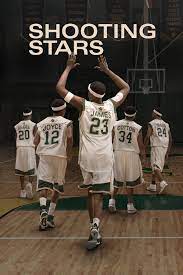
SHOOTING STARS
US, 2023, 116 minutes, Colour.
Marquis Mookie Cooke, Wood Harris, Caleb McLaughlin, Avery S. Wills Jr, Kahlil Everage, Sterling Henderson, Dermot Mulroney, Natalie Paul.
Directed by Chris Robinson.
American audiences have a great admiration for basketball champion, LeBron James. And he is well known throughout the world by basketball fans – and this entertaining biography would open up a wider range of interest and fans.
This film is about LeBron James and his friends at school, the Fab Four, growing up in Oregon. The film is based on the book, Shooting Stars, by James in collaboration with Pulitzer prize-winning author, Buzz Bissinger (Friday Night Lights) and the 2008 documentary, More than a Game. It is partly fictionalised.
The film focuses on the four friends emerging into their teenage years, all equal, different personalities, loving basketball, playing and bonding.
The issue arises of their being together in their high school years, their differences in height, abilities, putting them in different grades. However, whether to go to the local Catholic school where they could stay together – and, with negotiations, this is what happens.
The father of one of the boys, Dru Joyce (Wood Harris) is a solid and patient coach. However, a champion coach in his down days, played by Dermot Mulroney, is approached, sceptical, changed by seeing the play, encouraging the four even with his stern style.
At the end of the film, there is an epilogue giving information about what happened to each of the four in their successful careers. (James was not only successful in basketball but as a prolific film and television producer, including Space Jam: New Legacy.)
- A film for basketball lovers? American basketball fans?
- Audience knowledge of LeBron James, his talent, his career?
- The film based on his memoir, documentary film? His young days, pre-career?
- The Oregon settings? The friends, the Fab Four, their age, playing basketball, friends, school, growing together, the bonding?
- The four characters, treated as equals, Lebron James amongst them? The range of talent?
- James, the scenes at home, his relationship with his mother, growing up, his career?
- Dru Joyce, as coach, wise, calm, with his son? His lively son and his character?
- The issue of high school, the four together, their being separated in classes? The issue of the Catholic school? The applications, their attendance? Life at the Catholic school, its ethos?
- Dermot Mulroney as the coach, hard, his career, the interviews, his being persuaded to coach?
- The film showing the progress of the four young men growing up, their talents, collaboration, their careers, each succeeding in a different way? The emergence of Lebron James and his successful career?
- The epilogue, the information about each of the four and their subsequent successful careers?
Mist and the Maiden/ La Niebla y La Doncella
MIST & THE MAIDEN/ LA NIEBLA Y LA DONCELLA
Spain, 2017, 104 minutes, Colour.
Quinn Gutierrez, Veronica Echegui, Aura Garrido, Roberto Alamo, Marian Alvarez, Sanny van Heteren, Fernando Navas.
Directed by Andres M.Koppel.
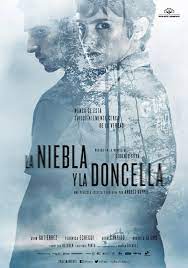 A Spanish murder mystery and a police investigation. The plot is complex, involving the police, politics, sexual behaviour, prostitution, drug dealing.
A Spanish murder mystery and a police investigation. The plot is complex, involving the police, politics, sexual behaviour, prostitution, drug dealing.
The advantage for the audience is the Canary Islands settings, a great deal of local photography, creating the atmosphere and helping audiences who have never been there to appreciate the landscapes, the seascapes.
At the centre is a young police investigator, Ruth (Veronica Etchegui, something of an Penelope Cruz lookalike). A dead body is found in the forest, a local politician accused, found not guilty. Three years later the case is reopened and two detectives come from Madrid and are joined by Ruth.
The details of the investigation follow, interviews, the reshaping of questions, the looking for clues, the opening up of the story, the dead man’s mother, his money, revelation about prostitution, the introduction of drugs themes and more extensive interrogations.
The film builds to a climax, some surprises with the twists – although the local police chief has always seemed ambiguous, his relationship with Ruth, with his pregnant wife, the investigation.
- Spanish murder mystery, police investigation?
- The Canary Islands settings, the islands, the terrain, the mountains, the winding roads, the forests, homes, police precincts? The ferrys and the sea? Musical score?
- The opening, the introduction to Ruth, the car in the mountains, the night, the winding roads, the pursuit, the mist? The search, the murdered man? The car, the blood, the official and his arrest? The trial and his being acquitted?
- Three years later, political intervention, opening up the case, the detectives from Madrid? The mother of the murdered man asking for Ruth? That she had brought the news of the death of her son, hugged her? Like work, his career, separated, love for his son, the phone calls? Serious? Virginia, past contact with Ruth? The team working together?
- Going to the island, discussion of the questions to be asked, the official and his being freed, the going to visit him, his stern reaction? The video, the murdered man, the sexual encounter, the official’s daughter, aged 14? Suspicions about him?
- The mother of the murdered man, German, supporting him, the issue of his expensive bike, his mother and money? Answering questions? The later revelations, his prostitution, bring in the money, the use of the boat? The relationship with Desiree, 14, the video on her camera? Shifting the question, the relationship between the two, her wanting the video as a memento? Her being interrogated, and sharing questions?
- The local police, Navajo, Ruth working with him, the relationship, the lunch with the whole family, the little girl, the wife, pregnant, suspicious of her husband?
- The drug issues, Ruth and Bam Bam, the list, the leads, the interviews, at the boat, friends, knowledge and non-knowledge, the issue of drugs on the islands? The revelation of The Mambo King? The story?
- Ruth, the sexual encounter with Bevilacqua, the aftermath?
- Ruth with the murdered man, in the car, the crash and her murder? The visit to the morgue? The clue?
- The visit to the mother, her motivation for the murder, the video, her being arrested?
- Nava and his wife on the ferry, interrogation by Bevilacqua, audience suspicions about Nava, the revelation of the truth about him and about Ruth?
- A satisfying murder mystery, the twists, Nava and his ambiguous behaviour throughout the story?
Past Lives
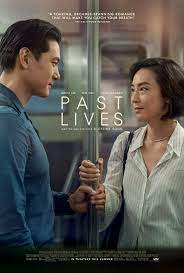
PAST LIVES
US, 2023, 105 minutes, Colour.
Greta Lee, Teo Yoo, John Magaro..
Directed by Celine Song.
It is said that writers should tell their own story. Playwright and director, Celine Song, draws on her own experience of her early years in Korea, her family migrating to Canada, her becoming a writer, marriage. But she enhances it with imagination, exploration of emotions, moments of communication, moments of silence.
There are several layers of meaning in the title, Past Lives. To else remembering their past and connections. However, there is an explanation of In-Yun (in-yuen) a Buddhist influence way of thinking, reincarnation, connections and past lives, bonding in the present, future connections.
Basically, the narrative takes place in three-time eras, opening in the present, going back 24 years, advancing 12 more years, coming back to the present. But the opening is tantalising, three adults at a bar, and a voice urging the audience to look at them, what the connections might be, the possible relationships. And the central character, Nora (Greta Lee) looks directly at camera. What are we thinking? What are we wondering? Who are these three?
The first part of the film takes place in Korea itself, and we are introduced to two 12 year olds, Na Young and Hae Sung, she always getting top marks, this time he beating her, and she crying in distress (something she often does). But, we see them as friends, playing together, their mothers having conversations – where will this lead? The immediate and sad answer is that her family is migrating to Canada. This moves him deeply. For her it is just part of life as she wishes him goodbye.
12 years later, Na Young has become Nora, a successful playwright, becoming very much a Korean North American in Canada. She attends a writing camp, meet writer, Arthur (John Magaro) and they bond. Meanwhile, Hae Sung(Teo Yoo) does his military service, rather unhappily, has a job, not satisfying, a girlfriend, but starts to look online for Na Young, not knowing she is Nora. When Nora he is about this, she makes a move and they have an online conversation, he devotedly remembering her and regretting her absence, she simply remembering a friend.
And then 12 years later again. Nora and Arthur are successful, he had a book launch signing, she writing plays, an apartment in New York City. And then Hae Sung decides to visit New York.
Celine handles this section of the film with great delicacy. The audience has got to know Nora very well and we wonder how this visit will affect her, friendship, affection, the presence of Hae Sung after 24 years. While the audience does know Arthur, we wonder how this visit will affect him and his love, his marriage. And what of Hae Sung, at this age, breaking with his girlfriend, wanting to see Nora again, devotion, rekindling love…?
In one sense, there is a great simplicity in the screenplay, the visit to New York, meeting, discoveries after 24 years, a tourist trip on the Hudson, a pasta meal at the bar. But, there is depth and complexity in the conversation at the bar, key to the whole film and the relationships, Nora between the two men, some speaking in English, some words in Korean, more and more Nora talking with Hae Sung, Arthur somewhat on the outer, but the conversation beautifully opening up Hae Sung’s devotion, Nora’s memories, her friendship and affection, her love for her American life, her love for her husband. And, while this conversation is dramatically telling – and she explains the conversation to Arthur, it is the final scene which so aptly and movingly bring this story to a conclusion, Nora accompanying Hae Sung to an Uber, their standing, silently, a distance between them, waiting for the car to arrive. And Nora returning to Arthur.
Great emotional exuberance – but profound emotional depth.
- The title, the past lives of Nora and Hae Sung, but the connections in past lives in terms of, Buddhist background, Korean interpretation, secular interpretation? Reincarnation?
- The autobiographical aspects of the narrative, the experience of the writer-director? Career, migration, Canada, New York, the literature and theatre world?
- In-Yun (in-yuen) and the Buddhist reflection, contacts in the past, contacts in the present, future contacts?
- The opening, the three people at the bar, the questioning, the possible relationships?
- Transition, 24 years earlier, school, Na Young and 80, the steps, talking, aged 12, her always getting top marks, his beating her in maths, her weeping? Their friendship, the play at the statue, their talk? The two mothers? The father and his filmmaking, home scenes? The decision to migrate? The two daughters, Na Young be unbecoming Nora? Saying goodbye, her friendship, but seemingly offhand, his deep feelings about her? Farewell, the plane trip, arriving in Canada, settling?
- 12 years later, Nora, her writing, theatre, at 24, relationship family, Internet connections, friends and career, discovering that he was looking for her, the contact, his motivations, missing her, memories of the past? Talking via computer, memories, the bonds, a change, his change, promising a visit?
- Nora, going to the writing school, meeting Arthur, working together, bonding? He and his military service, the glimpse, not happy? Flying to China? His friends, the drinking, girlfriend?
- 12 years later, Nora and Arthur in New York, his book signing, her theatrical writing? Married for many years, the apartment?
- Hae Sung, the plan to go to New York, letting Nora know? The flight, his arrival, the friends and the drink, storms and rain in New York?
- Arthur, his bond with Nora, learning some Korean, their shared interests and work? His reaction to the visit of Hae Sung? Nora and her reaction, meeting him at the airport, his settling in, his response, his love for Nora, the memories, the break with his girlfriend? His comment about earning money and supporting the wife?
- The tour of New York, the boat, the vistas of New York for the audience?
- The outing, his meeting Arthur, language, polite, loving pastor, the restaurant, sitting at the bar?
- The core of the film with the scene in the bar, talking, the two talking more and more in Korean, the depth of the conversation, the nature of love, of friendship? The exploration, Arthur patiently present? The conversation with Nora, her love for Arthur, the experience of meeting Hae Sung again?
- The next day, the farewell, the Uber, walking together, the long silence, the embrace, his departing? Her returning to Arthur?
Cordillera, La/ The Summit
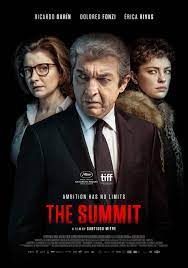
LA CORDILLERA/THE SUMMIT
Argentina, 2017, 115 minutes, Colour.
Ricardo Darin, Dolores Fonzi, Erica Rivas, Christian Slater, Paulina Garcia, Daniel Gimenez Cacho.
Directed by Santiago Mitre.
The Cordillera is a name for the peaks in the Andes – and they are seen to great advantage is the background scenery for this film.
The film is directed by Santiago Mitre who also made the Argentinian political film, Argentina 1985.
The audience is introduced to a political situation amongst the South American countries, especially concerning oil, business deals, collaboration, and connections with the United States. The occasion is a summit meeting in the Andes, hosted by the president of Chile. Central character, played with great dignity by Argentinian veteran, Ricardo Darin, is the new Pres of Argentina, present with his ministers and chief adviser (with whom is in a relationship). His daughter is summoned to the meeting, a fragile personality, married to a government connection, separated.
There is the story of the daughter, her kind of breakdown, hypnotherapy, creation of false memories, news of her drug-taking husband and a collapse, accusations taught her father of being a murderer.
But, there is always the story of the meetings between presidents, especially towards the somewhat arrogant Pres of Brazil, the dealing president of Mexico, a meeting between the Argentinian and an American diplomatic Envoy, played by Christian Slater, interviews with the Pres’s.
The material is interesting, behind-the-scenes, some Wheeler dealing, some deals, compromises. However, the film does not reach definite conclusions in either of its stories, remaining open-ended.
- The title, the Andes and the mountains, the vistas throughout, background to the summit?
- Latin American politics, the various countries of Latin America, Argentina, history, presidency, dialogue between nations, setting up of oil companies, agreements? Disagreements? Influence of the US?
- The opening, the discussions about oil, agreements, politics? Setting the scene? The political discussions throughout the film, the summit itself, the open forum, discussions, the agenda, behind-the-scenes, the role of Mexico, Brazil, the link with the US?
- Pres Blanco, his background, his aides, Luisa, the discussions, the ministers, travelling to the summit? News of his daughter, bringing her to the summit, her arrival, tensions? Her marriage, her husband, separation, the children, his drugtaking, his hold over the Pres, the threats?
- The Mariano themes, relationship with her father, the chair out the window, her catatonic state, injuries, the summoning of the psychologist, his session with her, her father’s reaction, the hypnosis, the story of the horse, the neighbour? Her being able to speak? Her father saying that the story was true, the neighbour was before her time, she never had a horse? The psychologist’s explanation about falls memories? The father and daughter discussions, the news of her husband’s collapse, her turning against her father, calling him a murderer? Not having any further hypnosis?
- The personal life of the president, his relationship with Luisa, the sexual encounter, his referring to it in his discussions with his daughter and her sexual encounters with her former husband?
- The Pres of Mexico, his agenda, calling Blanco aside, the discussions, the situation, his plans, American help, the central American countries and their collaboration, antipathy towards Brazil?
- The interviewer, her interview with the Pres of Brazil, his handling of the situation, not an Emperor…? His behaviour in the meeting, walking out? The interviewer and Blanco, parrying her questions, being called out for his daughter?
- The meeting with the American negotiator, his attitude, knowing the US reputation, yet the pressures on Blanco, the offering of the financial aid, Blanco bargaining? Going back to the meeting, the Mexican proposal, the walkouts, the president of chill and her handling the situation? Putting the issue to a simple vote, the plan for the central American countries and, therefore, American aid behind-the-scenes?
- The ending of the film, open ended, the Pres and his career, the daughter and her mental health, the collaboration of the Latin American countries, oil, the future?
OSS 117: From Africa with Love/ Alerte Rouge en Afrique Noire
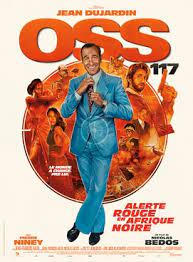
OSS 117: FROM AFRICA WITH LOVE/ ALERTE ROUGE EN AFRIQUE NOIRE
France, 2021, 117 minutes, Colour.
Jean Dujardin, Pierre Niney.
Directed by Nicolas Bedos.
This is the third in a series of spy comedy dramas, spoofs of such films as those of James Bond, this one more particularly with his title parodying From Russia With Love and the numbering of the agents.
The former films in the series were set in Rio and Cairo.
The hero of all three is Oscar-winning actor, Jean Dujardin, the first two films directed by the Oscar-winning director of The Artist Michael Hazanavisius before The Artist. However, he was not involved with this film, the new director, Nicolas Bedos, who made an impact with La Belle Epoque.
Whether this kind of spoof makes a telling impact with younger audiences, not familiar with the images of James Bond in his films from the 1960s, especially with Sean Connery, is difficult to tell. This image of James Bond and espionage, parodied a great deal in the 1960s, for example with the James Coburn’s Flynn dramas as well as Dean Martin as Matt Helm.
However, older audiences, may well enjoy the parody and the nostalgic memories which are being sent up. In fact, the situations, the characterisation of the central spy, Hubert, a lot of the dialogue is quite droll, not necessarily laugh out loud, but amusing, often witty, often clever, and most frequently spoof.
This is evident in the opening with the hero being tortured, a remote desert location, but suddenly turning the tables and escaping, the rescue at hand, female pilot and flirtation (and some behaviour from our hero, the setting being 1981, that might now get him accused of harassment). There is also the busy chief in Paris who sits at his desk, on the phone ordering all kinds of activity but safely at home. And a Miss Moneypenny equivalent.
We are also introduced to a new agent, Serge, OSS 1001, played by Pierre Niney. He admires the veteran exceedingly but this is not reciprocated. In the meantime, Hubert is taken out of action and sent, in 1981, to become familiar with computers – struggling at first, getting advice from the boffs and nerds, but eventually very successful. But, the younger agent disappears in Africa and Hubert is sent to rescue him. There is a great deal of sendup of the French image in the period of President Mitterrand. The dapper spy, always the smooth talk, ingratiating himself in society, having a way with the women.
This part of the film will be of interest to French audiences and colonial French audiences remembering the French colonial past, the presumptions of government in Paris, continually distancing themselves from being seen as racist but very racist-colonial in their attitudes and treatment of the locals. A whole lot of complications, quite an amount of intrigue against the President who is up for re-election, with rebels including his wife against him, having various doubles and more who can be shot for his survival…
Also themes of arms supplies, Russians with arms connections, depots in the jungle, explosions, and a whole lot of fights. Hubert is put in jail because of getting into a racist brawl, discovers OSS 117 there, takes credit for his rescue, but becomes involved in further adventures, the younger man being superior to the older – but being taken by a crocodile.
The smug older man returns to France – possibly for further adventures and the audience sees that the younger man has survived.
Tres Francais!
Old Way, The
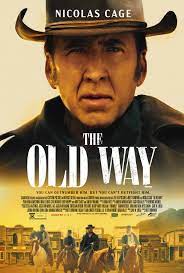
THE OLD WAY
US, 2023, 95 minutes, Colour.
Nicolas Cage, Ryan Keira Armstrong, Noah Le Gros, Nick Searcy, Kerry Kruppe, Clint Howard.
Directed by Brett Donowho.
Westerns seem to have found their place on television rather than on the big screen in the 21st-century. However, as the title suggests, here is a Western that reminds us of the old days, the old ways, including beautiful scenery in Montana, a musical score that is reminiscent of the classic scores of films like The Big Country.
The film opens with a lynching, a wealthy man accusing the victim of non-payment, townspeople crowding around, the son of the victim standing watching. But, also watching is a rather grim character, Briggs, played by Nicolas Cage. And the shooting starts, releasing the accused, the wealthy man shot, Nicolas Cage then taking money from the dead man, shooting those attacking him, shooting dead the father in front of his son.
Then a transition to 20 years later, Briggs now running a store, law and order in the town. He is married and has a young daughter, Brooke (a very strong performance on screen presence by Ryan Keira Armstrong). When a group of gunfighters arrive, we can guess that this is the son grown up and that he is bent on revenge, has served a prison sentence, has rounded up a group of associates, quite ruthless – confronting Briggs’s wife who puts up resistance, her horse killed from under her, her death.
As expected, the film turns into a vengeance pursuit, more complex because of the arrival of the sheriff and his associates, warning Briggs about the law, then caught in an ambush by the criminals and finally left by Briggs in the desert.
Of interest is the relationship between the gunfighter and his daughter (some commentators linking this theme with True Grit). As Briggs explains himself to his daughter, a harsh upbringing, minimal emotions, what we might call aspects of being on the spectrum. The scene of his explanations to his daughter as well as the daughter, very similar to her father, not crying, no grief… Is good strong drama.
And the film has its moments of suspense as to how Briggs will confront his enemies, the role that his daughter will play, and something of a high noon situation in the centre of the town. Not quite the ending we might have expected.
An interesting sequel would be to show what happens to Brooke when she is grown up.
- The title and expectations? A Western? Old stories? Old-style storytelling? For the 21st-century?
- Harsh West, hanging, gunfighters, the law, the changing West, more orderly, legislation, sheriffs? Revenge themes? The musical score, reminiscent of Elmer Burnstein et cetera? The beautiful backgrounds of Montana?
- The opening, the hanging, the taunting of the accused man, the wealthy accuser, the crowd, the little boy watching his father, the gunfighters, the accused cut down, the wealthy man shot?
- The presence of Briggs, silent, unemotional, the shootings, taking the money, being owed? The shooting of the father, the close-up of his son?
- 20 years later, Briggs, quiet, married, the relationship with Ruth, the relationship with Brooke, unemotional, walking his daughter to school, the teacher absent, her going to the store, his work, the long story about the outhouse from the customer (and Brooke later repeating it), stealing the jellybeans, her cleaning them and putting them in separate jars?
- Ruth, putting out the washing, the riders, the confrontation, her resistance, the attack, the house, the barn, riding out on the horse, the horse being shot, their taking her, killing her?
- The audience realising that the leader was the boy grown up, his accomplices, prison, their careers, robberies? The old man, Eustice, and the treatment? The young man and his relationship with the leader? They’re riding off?
- Briggs, walking home with Brooke, the discovery? The sheriff, his posse? Briggs and his not weeping? Brooke and her not weeping, the conversation with the sheriff about her sadness? Briggs burying his wife? The sheriff warning him against vengeance?
- Briggs, packing up, the temptation to kill Brooke, her looking at him? Giving her the rifle, the clothes, the horse, the pursuit, stops, short sleeps, getting water? Hearing the shots?
- The gang, the ambush for the sheriff and his men, the shooting? Briggs arriving, tying up the men, the sheriff and his warnings about the law? His tending to the bullet wound? Taking the horse, promising to leave it, not a horse thief?
- The gang, going to the town, in the saloon, Maria and looking after them? Placing each at the entry, the old man going to sleep, the boss’s treatment of him? the money, to spend it in Mexico? The packages with newspaper?
- Briggs and the plan, the long sequences of the father and daughter talking, insight into their characters, Briggs and his story, at home, emotionless, his way of surviving? A modern analysis – on the spectrum? His career, telling his daughter the truth, the encounter with Ruth, changing him, the store? Feelings of love? Brooke, the same, unable to weep, her father trying to coach her how to weep? Sending her into the town?
- The boss apprehending her, the group on the lookout for Briggs entering, the shooting? The discussions between the boss and Brooke, comparing fathers and fates?
- The buildup to the confrontation, a high noon in the street, the boss and holding Maria, the guns? The talk, the memories of what happened in the past? Briggs quick on the draw, Brooke and her quick action? Wounded, his daughter attending him? The death of the boss?
- The ways of the old west? Changing times? An interesting possibility for a sequel of Brooke in 10 years time…?
10 Days of a Bad Man
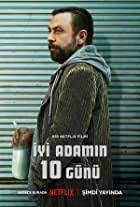
10 DAYS OF A BAD MAN
Turkey, 2023, 123 minutes, Colour.
Nejet isler, Riza Kocaoglu, Ilayda Akdogan.
Directed by Uluc Baraktar.
2023 saw the release of a Turkish drama, a Detective investigation, 10 Days of a Good Man. This sequel was released soon after. And, in the offing, is a third film, 10 Days of a Curious Man.
This film takes up two years after the original story, the central character driving through the desert, a car accident (and later suggestion that he might have been wanting to kill himself), rescued by two henchman of a gangster, Sir, to whom the central character, now calling himself Adil, is indebted.
There are actually two investigations in this film, Sir setting Adil to find a wealthy young man who has been responsible for Sir’s niece’s suicide. And we discover that this is a frame-up, to get the vengeance but to incriminate Adil. But Adil is also approached by a young woman, introducing him to her mother, the story of a murder with quite some complexity.
As the film progresses, both investigations are completed. Adil also has the help of a young woman, from the first film, young, sexually provocative, skilled with social media, tracking down the man that they are searching for, luring him on. And she is provocatively sexual towards Adil whol then tells her, along with flashbacks, the story of his marriage, his wife, the birth of their child, the death of both, the burial.
There are complexities with Adil as he goes on his way, quoting Hamlet, a variation on the Chandler and Hammett investigator.
There has to be some kind of tying themes together – to be ready for the third film.
- The second part the trilogy? The impact of the first film? Characters, situations, detection?
- A Turkish film, the atmosphere of Turkey, desert, locations, Istanbul? The musical score?
- The film drawing on the first part, establishing character, heroes, the villains in the behaviour in the first film, Sidak changing his name to Adil, the opening, driving the car, the accident, intending to kill himself? The encounter with Parminer, memories of the first film, the issue of his wife and daughter, the flashbacks, deaths, funerals? The first film and the encounter with Sir, gangster, the commission, fulfilment and death?
- Adil rescued by Sir’s henchman, his injuries, pain, painkillers, Sir and his treatment, the commission, to find the missing man, motivation, the two henchman accompanying him?
- The encounter with Buket, the story of the deaths, her wanting to commission him, being a doctor, the discussion about prescriptions, payment, her taking him to see her mother, the explanation of the scenario, suspicions? The dead man, his wife, fickle, the couple working, accused of stealing, disappearing, the butler, his leaving, the back story and his relationship? Adil accepting the case?
- Paminer, from the first film, her age, studies, sexually provocative, getting the information for Adill, social media, tracking down contacts, identifying the man search for, connecting with him on line, taking the provocative photos, sending them, his response? Her own life, plans, relationship with her mother? Tantalising Adill? In on the action?
- The investigation of the death of the murdered man, suspicions on Buket, storage the past, her cousins? Motivations? The discovery of the couple did on the Bulgarian border? The interview with the butler, his giving information? The final explanations?
- The night clubs, the search, Sir and his intervention, Adil realising the plot, Sir and his vengeance, the suicide of his niece, blaming the rich man, the gun, framing Adil? The two henchman, impressed by Adil, pledging their loyalty to him?
- The two henchman, developed as characters, their own lives, relationships, with Sir, changing allegiance, and their loyalty to Adil?
- Finding the young man, warning him off? His father, wealthy, connections? The setup for the confrontation, the guns, shootouts?
- The ultimate effect on Adil, health, loss of consciousness, recovering, the memories of his wife throughout the film, love for her, opening the hotel, the return, his mother, Paminer and the men, a new beginning?
